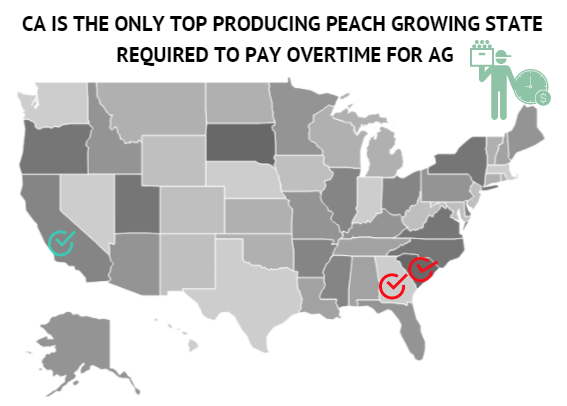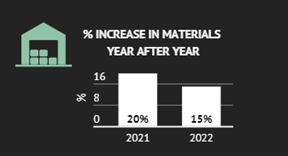California’s central valley is known as the “fruit-basket of the world”. The bounty of the Golden State can be found on the shelves of grocery stores feeding families throughout the country and the world. But that abundance of high-quality stone fruit grown in California is in a perilous situation. The events of the last two years have dramatically altered life as we know it, including the lives of California’s farmers. While the pandemic has helped to bring families back to their kitchens and home prepared meals and grocery retail has seen encouraging growth, the discouraging fact remains that farmers across the country are hurting like never before.
As harsh inflationary forces continue to drive up the cost of everything around us, we feel it is imperative to identify the realities facing the California stone fruit industry. Unprecedented increases in the cost to produce fresh produce as well as significant challenges in agricultural operations and logistics have forced countless farmers out of business and we ourselves are at a crossroads of facing decisions that we never thought would be considered. California farmers are now facing significant cost increases in packing and production materials, fuel, logistics, labor, fertilizers, tractors, energy, and water.
As Californians, we’ve raised wages $1 per hour per year for the last five years to a nation leading $15. 00 per hour and have standardized a 40-hour work week for agriculture employees while the standard work week was 60 hours in 2018. We grow our produce under the most progressive environmental policies within the U. S. and continue to deal with the rising cost of transportation driven by the global backlog in the supply chain. The increased minimum wage year after year in conjunction with reducing regular time and increasing overtime hours has compounded the labor cost increases.



The California stone fruit industry has faced an average 15% rise in costs each year for the last 3 years; that’s a 45% rise in overall cost.

The cost of shipping has increased by 100% over the last two years, cost of pallets up 50%, packaging up 20%, and sea freight up 50%.

All of this means that for our industry to remain viable, we simply must charge more for our fruit. These increases have resulted in the overall production cost per box to increase $7. 55 since 2019. This increase is equivalent to $. 42 per pound. Unfortunately, retail pricing has not increased at the same pace. Since 2019, retail pricing has only seen an increase of $2. 88 per box or $. 16 per pound.

The California stone fruit industry is making huge investments in cultural practices, production, and administration to find new efficiencies to drive costs out of our processes without affecting quality and safety. Just as farmers are finding new ways to survive, all companies in the fresh produce supply chain need to now revive their efforts to keep their farms profitable and sustainable. This includes finding process efficiencies wherever possible as well as asking consumers to pay more for the most wholesome and heathy food in their homes.
California is the “stone fruit state.” Over 80% of the nation’s stone fruit is grown in California with peaches at 70%, plums at 95%, and nectarines at 99% of total US production. These are labor-intensive commodities that must be meticulously maintained over the course of their growth and harvested by hand, without the help of mechanized methods utilized by other crops. However, we have the soil, we have the sun, and we have an industry that is committed to keeping delicious, fresh, and healthy California stone fruit in supermarkets because it’s what we love.
These are unprecedented times in our country and in our farming industry. As a united stone fruit industry who relies on agriculture, the time is now to understand that farming is in jeopardy and the time is now to build a plan of financial sustainability and longevity. This is our S. O. S. to those who have long valued our industry. To all our partners in the retail space, we need your support to ensure that fresh California peaches, nectarines and plums have a place on kitchen tables for families across the country and the world to enjoy.
Ian LeMay is the President of the California Fresh Fruit Association, one of the state’s oldest agricultural trade associations, representing growers, shippers and marketers of fresh grapes and deciduous tree fruits.
For more opinions and ag news, go to: www.Agri-Pulse.com.

